Chinese Herb Farming in the Pacific Northwest
Just outside of Olympia, WA Colleen Hayes is growing some crops that may seem unusual to some. She started growing Chinese and other Asian medicinal herbs 5 years ago after wondering where the herbs her acupuncturist gave her came from. She has trialed over 35 species and is now growing larger quantities of herbs like Ju Hua, Hong Hua and ashwaganda. Mayway asked her some questions about what it’s like to grow and process Chinese herbs here in the US.
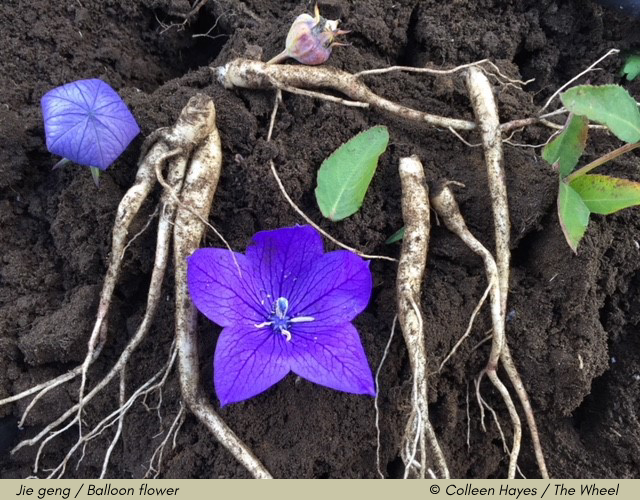
Have you always been a farmer and is that your full time job?
No, and I am not a full-time farmer, especially not in the way our society thinks of a farmer. I have paid attention to plants everywhere I go for many years, however. Traditionally, families and communities had fairly defined support systems to carry out the livelihood of “farming.” Nowadays, families are spread out, people stay inside, and farming is not encouraged as a profession. Farming is much more complex than people realize. It involves economics, ecology and endurance. It is a challenge to survive as a farmer alone. Just as our ideas of communities and family are being redefined, so is the idea of farming. Currently, my main source of income is working for an organic certification agency. I spend the rest of my time and energy thinking about the plants and farm business though.
How did you get started growing commercially?
My interest in East Asian and Ayurvedic health philosophy has coincided with my interest in tending plants. For the last 20 years, the books I read in my free time have been about eastern medicine, plants and cooking. I have worked on farms and in nurseries and been an avid gardener, but after I got my hands on Peg Schafer's book "The Chinese Medicinal Herb Farm," the wheels really started turning for me. I connected with her writing and the philosophy of growing Chinese medicinals. And having used TCM formulas, I had wondered - just as I do with all food I consume - where did the herbs in this formula come from?
I noticed plants from all over the world already growing well in the United States, and we are at the same latitude as parts of Asia. In 2014, I became involved in a network of East Asian medical practitioners and growers who all wanted to increase the availability of domestically produced Chinese herbs in the Pacific Northwest. I attended conferences and meetings and learned cultivation and market considerations. Overall, I wanted more acupuncturists and their patients to have the option to know the source of their herbs. So, slowly... I have increased production.
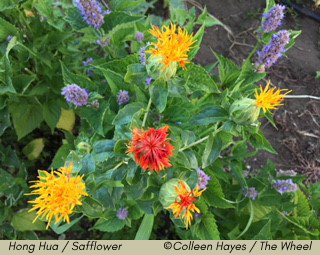 For medicinal plants, the stresses of growing in the wild are known to create more potent medicine. How do you recreate those stressors on the farm?
For medicinal plants, the stresses of growing in the wild are known to create more potent medicine. How do you recreate those stressors on the farm?
My approach in growing medicinal herbs is a combination of organic and wild-simulated practices. I create a space for plants to get established. Hopefully they resonate with their setting, and then the plants and nature lead the way. Many medicinal herbs are perennials, so they stay put for years. They experience weather and animals and respond by developing what we know as medicinal constituents. If they look unhealthy, I consider what is happening overall to determine if and how I should intervene. Most of the time I trust the plants and allow them to respond in their own way, but continue to keep them weeded and watered. There are plants that don't like lots of water, or maybe they'd benefit from weed competition, so I adjust temporarily. Another way I ensure constituents are developed is to not spoil the plants with fertilizer or respond to imperfection with chemical products. I might grow them in rows, but I don't approach them as annual vegetables for quick production. I pay attention, but remember I am growing medicine.
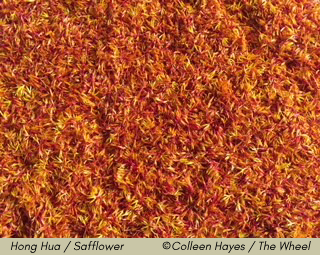 How will the herbs you grow be processed and stored? How is that different from Chinese methods?
How will the herbs you grow be processed and stored? How is that different from Chinese methods?
Thus far, I’ve only dehydrated herbs. I am familiar with Pao Zhi and would like to eventually incorporate certain methods in to my repertoire. Along with growing plants, I like to cook. I am a practical, seasonal cook. In Pao Zhi workshops, I have felt very comfortable with the techniques presented, simply because my growing and cooking experience lends to my understanding of food science. I inherently “know” the alchemical changes, from working with food. I also apply this knowledge to packing and storage. Ventilation, light, humidity and temperature are all considered. Post-harvest handling is just as important as cultivation. We do need more of the post-harvest equipment here in America.
How do you verify species, quality and efficacy?
Species: I refer to the botanical identification of the seed or plant stock offered. If I have any doubt about the supplier or plant type, I will not purchase. I am seeking medicinal cultivars that have not been hybridized for showy flowers or some other ornamental quality. Seed availability is definitely a limiting factor in producing these plants.
 Quality: I use a combination of science and senses, just like how an acupuncturist works with a person. I familiarize myself with the TCM use of the plant, including which portion will be used. I research harvest and post-harvest considerations. I think about which plants are similar if it's not typically grown in the United States. All in all, I take cues from the plant, the weather, and guidance from TCM resources.
Quality: I use a combination of science and senses, just like how an acupuncturist works with a person. I familiarize myself with the TCM use of the plant, including which portion will be used. I research harvest and post-harvest considerations. I think about which plants are similar if it's not typically grown in the United States. All in all, I take cues from the plant, the weather, and guidance from TCM resources.
Efficacy: The aroma alone feels pretty efficacious. I have been educated in our empirical western culture, and understand the desire for data and measurements. However, my senses are a live and strong tool for determining efficacy. Part of why I am growing these herbs is because they are used differently from taking one herb and applying it to a symptom. There are many uses and combinations of Chinese herbs. Their efficacy will depend on the practitioner's understanding of a patient and use of the herb. I do ask for feedback from acupuncturists. I have participated in workshops where we've attempted to classify Chinese herbs using sensory analysis, also known as organoleptic evaluation - to outline efficacious characteristics. I really like that Chinese herbology does not limit an herb to one use, but welcomes the possibilities for application, depending on patient, intuition and classical use.
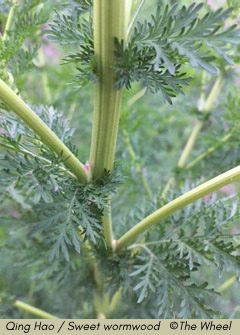 I understand there are several networks for medicinal herb growers, allowing them to market their herbs to buyers. Can you tell us more about this?
I understand there are several networks for medicinal herb growers, allowing them to market their herbs to buyers. Can you tell us more about this?
My involvement in a Pacific Northwest group of East Asian medical practitioners and growers fueled my interest in growing these herbs. When deciding to take on any business endeavor, it helps to know what you'll be charging for your product or service. This information is not easy to find, so having the encouragement and support of the network helped. There is a real demand for local availability of these herbs, along with a great respect for the age-old wisdom. American acupuncturists want local, but are also concerned herbs produced in the States won't be the same. I completely understand this notion, and only hope to provide alternative, clean options. Maybe eventually, these herbs will be accepted and esteemed similar to the evolution of wine grapes grown in the United States.
Relatively speaking, TCM herb growing in the U.S. is still in its infancy. How do you see it looking in another 10 years?
I do think the demand for domestically produced herbs will continue to grow. People will continue to question supply chains and science will present new information about plant families. If we can accept these herbs as we've accepted plants from Europe and elsewhere, we will make strides. Acceptance of Asian culture and its ancient wisdom, rather than skepticism and fear will help too. I hope American-born acupuncturists continue to study herbs, as I know herbs are misunderstood in the United States. This will be part of the paradigm shift too.
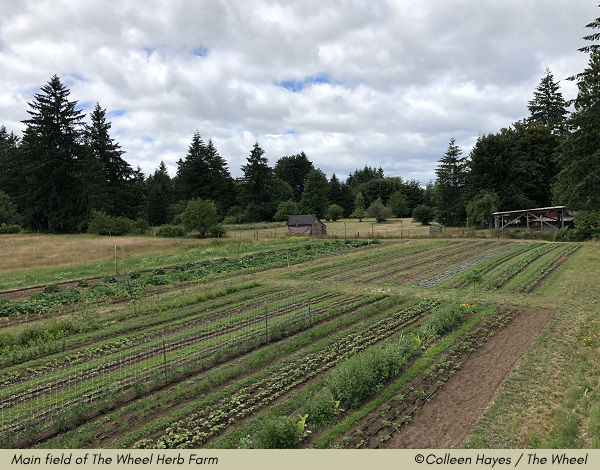
To fulfill the supply demand of American acupuncturists however, market information will need to be available to banks and growers. Currently, a bank is reluctant to support efforts to grow these herbs because production and yield information is not readily available. In order to formally study the herbs or have access to market rates, one must have a degree in Chinese Medicine. I understand the reasoning for this, but it’s definitely an obstacle. Most existing farmers wouldn't take on these crops with the current lack of market and growing information. Much farming is based on annual crops and semi-predictable income. I am fortunate to have other income, as I am investing time, money and energy in some crops I won't harvest for at least 3 years!
Your primary job is for an organic certification agency. What does that mean for your farm?
It means two things: 1) I am familiar with the federal organic regulations. And, 2) I am not able to spend as much time as I want on the farm. Otherwise, they are not directly connected. I recently became certified organic because I want to be able to market my herbs as they are grown. The international market inspires me to increase local supply. Companies from other countries can go through the process of becoming certified organic to USDA organic regulations. However, ensuring organic integrity in the audit trail of a crop from farm to end consumer is a challenge with multi-business and multi-border supply chains.
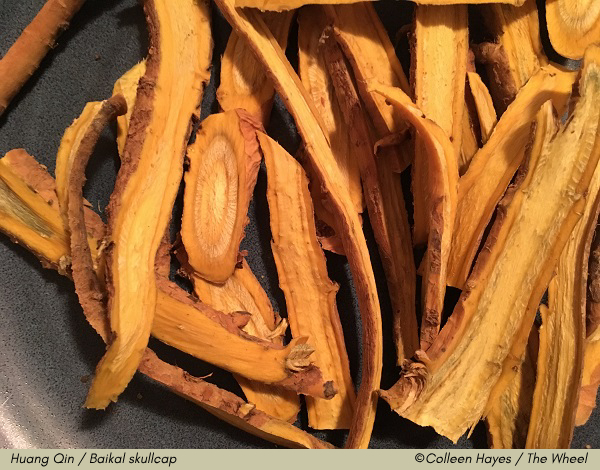 How much of an herb does a farm like The Wheel grow in a season? (Mayway typically buys a ton at a time for our popular herbs)
How much of an herb does a farm like The Wheel grow in a season? (Mayway typically buys a ton at a time for our popular herbs)
I produce pounds - definitely not tons! I do small trials initially, prior to larger production. I cultivate medicinal herbs in general. There are many TCM herbs in the Materia Medica that grow in the Americas. I would like to move towards contract growing for certain herbs. I am easily influenced to grow things per request, as I have a green thumb and love plants!
The plants I am growing in larger quantities are carthamus (Hong hua), perilla - fresh and dried (Zi su ye), ashwagandha root, astragalus (Huang qi) and Chinese mums (Ju hua). There might be others, but those are certain this year. Baikal skullcap (Huang qin), codonopsis (Dang shen), Angelica dahurica (Bai zhi), Dan shen, and hog fennel will be harvested in a few years.
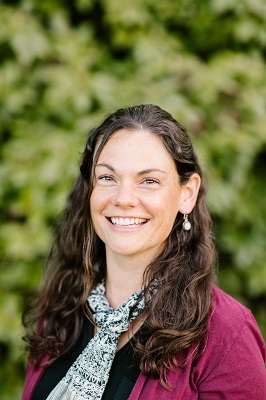 Colleen Hayes is the owner of The Wheel Herb Farm a certified organic, three acre farm outside of Olympia, WA. She has twenty years experience working with ornamental, edible and medicinal plants in various settings. Her academic background in environmental health gave her an understanding of the American health care industry and fueled her desire for something different. Her strong appreciation for traditional Chinese medicine has inspired her focus on herbs for medicinal and culinary use.
Colleen Hayes is the owner of The Wheel Herb Farm a certified organic, three acre farm outside of Olympia, WA. She has twenty years experience working with ornamental, edible and medicinal plants in various settings. Her academic background in environmental health gave her an understanding of the American health care industry and fueled her desire for something different. Her strong appreciation for traditional Chinese medicine has inspired her focus on herbs for medicinal and culinary use.

